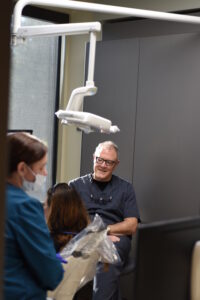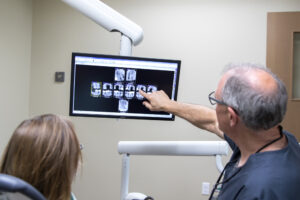
Most of us have four wisdom teeth at the back of the mouth, also called third molars, which typically erupt between the ages of 18 and 24. Because the wisdom teeth are the last of our teeth to erupt, often most of the room in the jaw is already used up and cannot easily fit the wisdom teeth.
Because there is little room for new teeth, wisdom teeth can cause intense pain and severe gum infection. The best treatment to prevent this is wisdom tooth extraction.
Should I Consider Getting My Wisdom Teeth Taken Out?
As described above, the pain that can occur with wisdom teeth is the primary reason for wisdom tooth extraction. Wisdom teeth are often removed for the following additional reasons:
- Impacted Teeth: Without any space to grow in properly, wisdom teeth can become trapped under the gums (impacted) or grow sideways.
- Mouth Pain/Pressure: Wisdom teeth that are trying to break through the gums can cause pressure and move other teeth out of place.
- Braces: Many people need wisdom tooth extractions before orthodontic treatment (braces or Invisalign) or right after.
- Pouches: Partially erupted wisdom teeth can form a pouch that traps food, which can cause the wisdom tooth and the teeth around it to decay.
- Gum Swelling: The gums around wisdom teeth may become infected and cause swelling, pain, and a bad odor.
- Cysts: Wisdom teeth trapped in the jaw bone can cause a cyst to form. Cysts can push other teeth out of place and in rare cases form a tumor.
- Dentures: Patients who are about to have dentures constructed should have their wisdom teeth removed.
What if My Wisdom Teeth Are Impacted?
Impacted wisdom teeth are wisdom teeth that are partially or fully trapped and unable to emerge from your gums or jawbone. Fully impacted wisdom teeth can still be treated, but the removal procedure and recovery time afterward will be more extensive. Please be aware of the following symptoms of impacted wisdom teeth and consult our dentists right away if you notice any of the following:
- Swollen or bleeding gums
- Inflammation of the surrounding gums
- Facial swelling and stiffness of the jaw
- Pain near the wisdom teeth or in the jaw
- Infection near the wisdom teeth (i.e. swelling, pain, and bad odor)
Why Choose Silverdale Dental Center for Your Wisdom Teeth Extraction?
Wisdom teeth extraction is an extensive procedure, so we’ll provide you with sedation to make sure you’re comfortable. Our team of dental practitioners has performed many wisdom tooth extraction procedures.
We believe that taking care of our patients should involve more than just the time spent in the office. We will create the right treatment for your needs and discuss what you will need to do after the surgery has been performed. The time you spend recovering after having your wisdom teeth extracted is very important, so we will guide you on what you need to do to reduce the risk of infection and after-surgery pain.
Our dental team is more than happy to answer any questions you may have about wisdom teeth extractions, so contact us today to learn more about this vital procedure!
Common Questions About Wisdom Teeth Extractions
What Should I Expect After Having My Wisdom Teeth Removed?
After you have your wisdom teeth extracted, you will likely need to take several days off from work or school. While you should be able to return after several days, full recovery before your mouth is fully back to normal can take two to three weeks.
You will likely experience some lingering pain after surgery, and you’ll need to regularly and carefully clean out your mouth. Failure to do so can further aggravate your mouth pain and potentially lead to a dry socket, which is extremely painful and can lead to infection.
To reduce the risk of infection, we recommend incorporating the following during your recovery period:
- Avoid extensive activity for two to three days following surgery.
- Gently clean your mouth with an antimicrobial mouthwash.
- Carefully brush your teeth. Be gentle—do not swish or brush too hard.
- Take all recommended medications including any pain relief.
- Eat soft and easy-to-swallow foods, such as pasta, rice, and ice cream.

Wisdom Tooth Pain: How Much Will It Hurt?
Wisdom teeth extractions can require extensive surgery, but the actual procedure shouldn’t hurt. Our patients are numbed to the pain during the operation with the help of local anesthesia or more extensive sedation.
The recovery after the procedure can be painful for many patients. This is especially true for those who do not follow recommended recovery instructions after surgery.
How Long Do Wisdom Teeth Extractions Take?
The actual procedure will take one to two hours. However, we typically require multiple appointments to properly prepare patients for the treatment. Also, we highly recommend taking at least two days off from work or school after surgery to recover.
We want to do our best to work with your schedule!
How Much Does Wisdom Tooth Removal Cost?
There are many factors to consider when it comes to determining wisdom teeth removal cost:
- The extent of surgery
- The type of anesthetic needed
- The number of teeth that need to be removed
Please schedule a consultation with us for a more in-depth breakdown of how much you can expect to pay for wisdom teeth extractions.
Give Us a Call Today To Schedule Your Wisdom Teeth Removal Consultation
At Silverdale Dental Center we are open six days a week and offer extended business hours.

